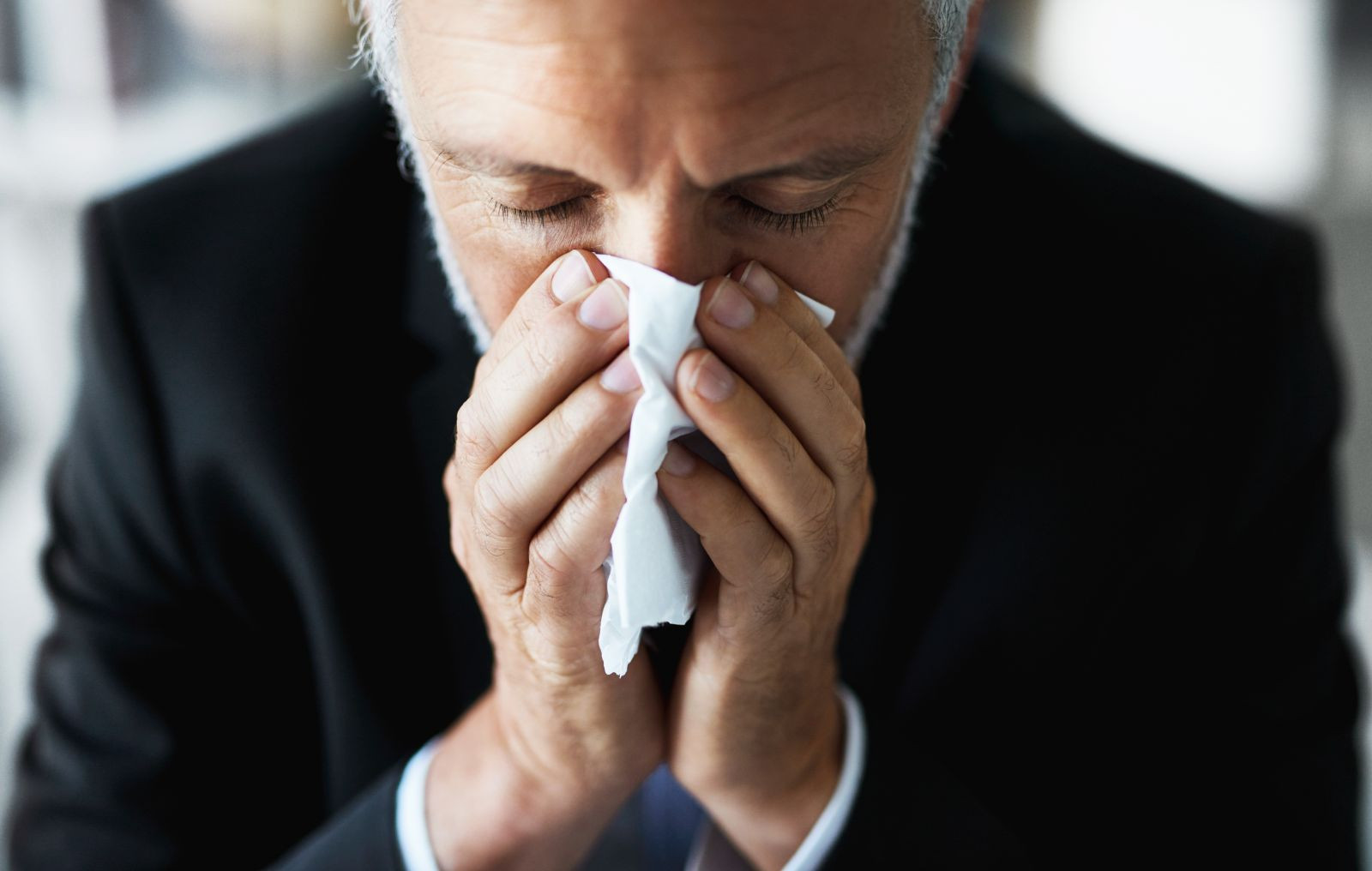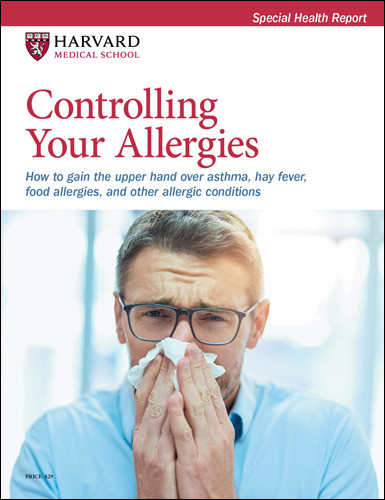Allergic rhinitis: Your nose knows
If your nose is itching it may be allergic rhinitis

It's easy to dismiss hay fever as a minor nuisance. But call it by its proper name, allergic rhinitis, and you'll be on the way to recognizing it as a legitimate medical problem. Add the fact that it affects about one of every five Americans and drains the economy of billions of dollars each year, and you'll see that it's an important problem indeed. Fortunately, it's also a problem that responds very well to treatment.
Itchy nose and seasonal allergies
If a man thinks about his nose at all, he's likely to think of it as a simple organ of smell. It's true, of course, that the nose is responsible for the sense of smell, but smell means much more than the ability to enjoy pleasing scents. Because smell contributes importantly to taste, it plays a central role in maintaining good nutrition. Smell can also warn us of dangers ranging from toxic fumes and smoky fires to spoiled food.
Allergic rhinitis can blunt the sense of smell, and it can also interfere with the other important functions of the nose. When your nasal passages are functioning normally, about five to eight quarts of air pass through them each minute. Your nose has the job of conditioning that air before it reaches the sensitive tissue of your lungs. Your nose adds moisture, but to do that, it must produce large amounts of mucus. It also warms the air, with help from a large network of blood vessels. Finally, the nose traps small particles, keeping them out of the lungs.
If you have allergies and your nose traps pollen or other particles to which you are sensitive, an inflammatory process starts right in your nose. Immune system mast cells in the nasal tissue release chemicals such as histamine and leukotrienes. Blood vessels swell, causing nasal congestion, and mucus production soars, creating a runny nose. Just like that, you've developed some of the symptoms of allergic rhinitis — and some of your nose's normal functions have been compromised.
Types of rhinitis
Allergic rhinitis is the most common. Seasonal allergic rhinitis comes and goes as various plants come into bloom. If your symptoms occur in the spring, you are probably allergic to tree pollen; in the summer, grass and weed pollens are the likely culprits; in the late summer and fall, ragweed is the most likely cause. But if your symptoms occur year-round (perennial allergic rhinitis), you are probably allergic to indoor allergens such as dust mites, mold, or animal dander.
Rhinitis can also occur without allergies. Examples include viral rhinitis (the common cold); drug-induced rhinitis (possible culprits include Viagra and the other ED pills, the alpha blockers used for benign prostatic hyperplasia, the ACE inhibitors and beta blockers used for hypertension, and aspirin and non-steroidal anti-inflammatory drugs); and hormonal rhinitis (including the "pregnant nose" experienced by some women). In some people, exercise, eating, and exposure to cold or dry air, air pollutants, or strong smells can trigger rhinitis. Inflammation is absent in non-allergic rhinitis, and the symptoms are limited to a runny, stuffy nose.
A final category of rhinitis can be particularly tricky. It's rhinitis medicamentosa, irritation of the nasal membranes caused by overuse of decongestant nasal sprays such as phenylephrine and oxymetazoline that some people use for quick relief of allergic rhinitis.
Symptoms of allergic rhinitis
Nearly everyone with allergic rhinitis complains of an itchy, stuffy, runny nose. Sneezing is nearly as common, and a post-nasal drip can trigger coughing. Typical symptoms extend beyond the nose to include an itchy or sore throat and itchy, burning, watery eyes that may look red due to allergic conjunctivitis.
Asthma, eczema, and sinusitis
Between 20% and 40% of patients with allergic rhinitis also have asthma. Other allergy-related disorders such as eczema may also be present. Some patients have nasal polyps, a deviated nasal septum, or sinusitis.
Allergic rhinitis diagnosis
Most people with allergic rhinitis can diagnose the problem themselves simply by recognizing typical symptoms. In complicated cases, an ENT (ear, nose, and throat) specialist can check for polyps and other nasal abnormalities. If it is important to identify specific allergic triggers, allergists can perform skin tests; the so-called RAST blood test can also help pin down the culprits.
Treatment of allergic rhinitis
Three strategies are available: avoiding triggers, using medications to reduce symptoms, and getting immunotherapy ("allergy shots").
Avoiding triggers. Here are the steps to take for seasonal rhinitis:
- Limit your outdoor activities when pollen counts are high. Ragweed counts usually peak in early midday, grass pollen in late afternoon and early evening. If you have to do yard work during pollen season, wear an N95 mask. Shower, wash your hair, and change your clothes afterwards.
- Keep your windows and doors closed as much as possible during pollen season.
- Use air conditioners instead of fans, which bring in outside air. Drive with your windows and vents closed and your air conditioner on.
For year-round allergic rhinitis:
- If you have a dog or cat that triggers symptoms, have it bathed weekly and do your best to keep it off furniture and out of the bedroom.
- Put pillows, box springs, and mattresses in sealed plastic covers (allergen encasements) to keep out dust mites. Wash bedding in hot water (above 120° F) to kill dust mites.
- Remove carpets from your bedroom.
- Use a dehumidifier to keep relative humidity below 40%.
Medication. Many treatments are available. Here's a quick summary of the major types.
Antihistamine tablets will help most patients. For the majority of people, one of the less sedating preparations will be best. Many are available over-the-counter, such as loratadine (Alavert, Claritin, generic), cetirizine (Zyrtec, generic), and fexofenadine (Allegra, generic). High doses can produce sleepiness and dry mouth; men with benign prostatic hyperplasia (BPH) may have difficulty urinating.
Nasal steroid sprays are very effective but usually take several days to kick in. Like the oral antihistamines, these drugs can relieve eye symptoms as well as nose symptoms. Examples include budesonide (Rhinocort Allergy), fluticasone (Flonase Allergy Relief), and triamcinolone (Nasacort Allergy 24HR), which are available without prescription. Side effects may include nasal irritation and headaches.
Antihistamine nasal sprays are an alternative to oral antihistamines. Azelastine (Astelin) and olopatadine (Patanase) are available by prescription; some patients experience a bitter taste or drowsiness.
Leukotriene blockers, such as the oral prescription drug montelukast (Singulair), relieve most symptoms of allergic rhinitis. Headache can be a side effect. Also the FDA has issued a warning about mental health side effects, including suicidal thoughts.
Decongestants are available without prescription as tablets (pseudoephedrine, phenylephrine) or nasal sprays (phenylephrine, oxymetazoline) and can relieve nasal congestion but have little effect on other allergic rhinitis symptoms. Side effects may include nervousness, racing heart, elevated blood pressure, and insomnia. Men with BPH may have difficulty urinating. Decongestants should not be relied on for primary treatment but can be combined with a first-line drug for temporary use. You should not use a decongestant nasal spray for more than a few days.
Other medications include an anticholinergic nasal spray called ipratropium (Atrovent), which is effective only for runny noses and various anti-allergic eye drops can be used to treat eye symptoms. In rare cases, patients with severe rhinitis may need a short course of oral steroids.
Immunotherapy, or "allergy shots," can help achieve long-term control of allergic rhinitis. The regimen usually involves skin testing to identify the responsible allergens followed by weekly injections of gradually increasing doses of the allergen, and then maintenance injections every two to six weeks for several years. Most doctors reserve immunotherapy for patients who do not respond well to medication.
The itchy nose knows
For many people, allergic rhinitis is a temporary seasonal woe, but for others, it's a year-round hassle. And for some, it can be linked to asthma, sinusitis, or other more serious problems. Because allergic rhinitis is so very common, it also adds up to an expensive proposition for American society.
If you are one of the unlucky many with allergies, you'll have to learn to deal with the problem. Avoid exposure to things that trigger symptoms. Experiment with medications to control symptoms; non-sedating antihistamines, antihistamine nasal sprays, and steroid nasal sprays are among the first-line treatments. Some men may prefer one of the many other drugs that are available, and others need combination therapy. Immunotherapy is available for particularly difficult cases.
The many options for treating allergic rhinitis can be confusing at first, but if you take the time to nose around, you'll find a way to keep your nose working smoothly — without running!
Image: ©PeopleImages | GettyImages
Disclaimer:
As a service to our readers, Harvard Health Publishing provides access to our library of archived content. Please note the date of last review or update on all articles.
No content on this site, regardless of date, should ever be used as a substitute for direct medical advice from your doctor or other qualified clinician.
















